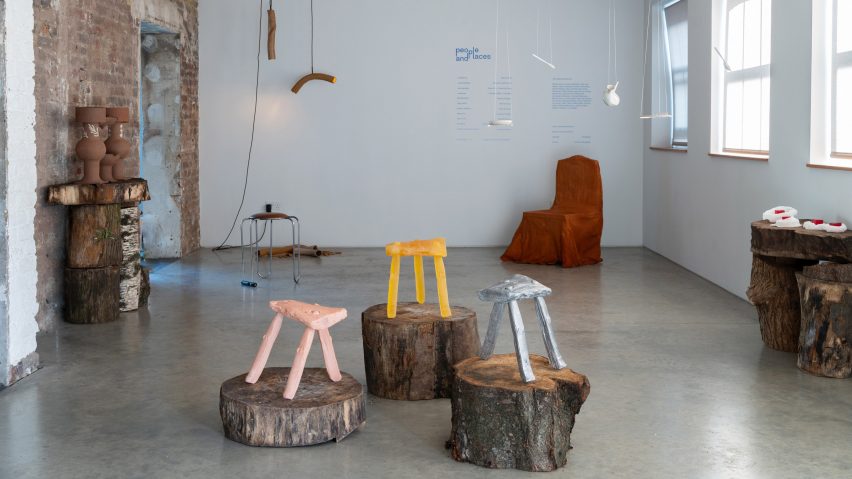Design students from the Chelsea College of Arts have staged an exhibition at Yorkton Workshops in Hackney that acts as "a microcosm of London" and explores the issues keeping its residents up at night.
The show, called People and Places, was curated by Dezeen Award-winning designer Liang-Jung Chen and includes projects that find new uses for hyper-local materials – from broken locks left behind by bike thieves to clay foraged from Hampstead Heath.
Created by 14 designers from eight different countries, the works on display also broach more far-flung topics around belonging and emigration, including a set of zero-gravity tableware designed for space travel.
"The cohort is quite diverse in all aspects," Chen told Dezeen. "Not all of them are young. Some of them decided to change their career path and came into design at middle age. I really feel like it's a microcosm of London."
Among the projects that reference the city most explicitly is 20,000 by Cameron Griffin, a furniture collection named after the number of bikes stolen in the capital every year.
It features stools made using the many useless bike locks left behind on fences and bike racks in the wake of these thefts.
"The problem is, because the keys are not there, you can't really open the locks," Chen said. "So he salvaged the metal rods and bolted them together with the actual lock part to create a kind of collage of different locks."
Austrian designer Hannah Rot found local clay in Hampstead Heath, a sprawling heathland in north London, which she left unfired and extruded to create a series of tubular lampshades.
Although these will break more easily than their fired counterparts, they can be endlessly re-moulded into new shapes.
"It's a unique response to the pursuit of sustainability," Chen said. "There's a saying in design that if you make something desirable, it's sustainable because people are not going to throw it away. But here, she takes the opposite route."
For South London designer Rush Barnett, the focus was on London's drinking culture, which inspired him to create a sculptural ceramic wine fountain and matching drinking vessels.
Based on Ancient Green kylix cups, these were designed to form a mask over the user's face when they take a sip, portraying various grotesque expressions associated with excessive drunkenness.
Other students explored the growing popularity of alternative wellness remedies to deal with the everyday stress of living in London, with Samuel Sant presenting a series of kinetic incense burners while Yve Belle made a tactile tool kit for dealing with sensory overload.
Jaeun Sim focused specifically on mourning, creating a hybrid between a traditional Korean offering vessel and a fidget toy, designed to encourage ritualistic spinning and prompt emotional processing.
A number of international students took the People and Places exhibition as a chance to reexamine their relationship with home.
Among them was Palestinian-Jordanian designer Sanad Khoury with his sculptural water fountain that flows almost in slow motion, filling up a bowl drip by drip as an allegory for his endless wait to find a home.
And there's Maria Gil, who formed a wardrobe from rebar and translucent fabric, offering a "retro-speculative" imagining of what postmodern design would have looked like in Poland if creative expression hadn't been heavily policed under Soviet control.
"I think her experience of living in London really prompted her to explore her Polish roots because Eastern Europeans are less represented or don't feel very seen in the European design industry," Chen said.
"So, very early on, she made up her mind to really ask: why is that? Why is Polish design not as trendy as Scandinavian?"
Instead of focusing on her native Latvia, Klinta Locmele chose to explore where we will live in the future with a collection of zero-gravity tableware designed to make humanity's migration to Mars more pleasurable.
The six-piece collection features a spikey spoon and plate, to which food can be skewered while carefully placed ridges catch any liquid.
"In zero-gravity environments, liquids will only stick to the surface," Chen explained. "So you need the grooves and the spikes to increase the surface area."
The exhibition at Pearson Lloyd's Yorkton Workshops, which also featured work by Jianming Fang, Romeo Hodges, Selina Zhu, Zac Slater and Haochun Wang, was organised entirely by the students.
"They had to do an independent show, entirely outside of the university context and resources," said Chen, who took home a 2021 Dezeen Award for her own work before becoming an associate lecturer at the Chelsea College of Arts.
"So they did this pretty much on their own."
The projects were displayed on pieces of felled timber, loaned from the London Green Wood workshop at Hackney City Farm and subsequently returned to be made into spoons, bowls and other products.
The photography is by Romeo Hodges.
People and Places was on show at Yorkton Workshops in London from 17 to 18 May. See Dezeen Events Guide for an up-to-date list of architecture and design events taking place around the world.

